Removal Procedure
Notice: If the engine is damaged internally and a new engine assembly is installed in the vehicle, ensure that all foreign material is flushed out of the cooling system. You must also flush out the oil cooler system. Failure to rid the oil cooler system of debris can result in engine damage.
Tools Required
J 41427 Engine Lift
Brackets
- Disconnect the battery negative cable.
- Remove the air cleaner outlet duct. Refer to Air Cleaner Outlet Duct Replacement in Engine Controls.
- Drain the engine coolant. Refer to Cooling System Draining and Filling in Engine Cooling.
- Remove the radiator inlet and outlet hoses. Refer to Radiator Hose Replacement in Engine Cooling.
- Disconnect both heater hoses.
- Remove the upper radiator shroud. Refer to Fan Shroud Replacement in Engine Cooling.
- Remove the drive belt. Refer to Drive Belt Replacement .
- Disconnect the electrical connectors on the top of the engine.
- Disconnect the positive battery cable at the generator.
- Remove the accelerator control cable and the cruise control cable, if equipped. Refer to Accelerator Controls Cable Replacement in Engine Controls.
- Remove the engine cooling fan. Refer to Fan Replacement in Engine Cooling.
- Remove the crossover pipe from the AIR check valve, if equipped.
- Remove the air conditioning compressor, if equipped, and set the A/C compressor aside. Refer to Air Conditioning Compressor Replacement in HVAC.
- Remove the power steering pump pulley. Refer to Power Steering Pump Replacement in Steering.
- Remove the mounting brackets from the power steering pump using the following procedure:
- Raise the vehicle. Refer to Lifting and Jacking the Vehicle in General Information.
- Remove the starter motor. Refer to Starter Motor Replacement in Engine Electrical.
- Remove the starter opening cover.
- Remove the bolts that retain the torque converter to the flywheel, if equipped.
- Disconnect the transmission cooler pipe bracket from the right side of the oil pan, if equipped.
- Remove the exhaust pipe from the exhaust manifolds. Refer to Exhaust Pipe Replacement in Engine Exhaust.
- Support the transmission with a suitable strap.
- Remove the engine oil cooler pipes, if equipped.
- Remove both the engine mount through-bolts. Refer to Engine Mount Replacement .
- Remove the bolts and the bracket that retain the transmission to engine.
- Lower the vehicle.
- Disconnect the remaining electrical connectors.
- Remove the distributor cap.
- Disconnect the fuel pipes. Refer to Fuel Hose/Pipes Replacement - Engine Compartment in Engine Controls.
- Remove the EGR valve pipe.
- Attach the J 41427 to the left front and the right rear mounting bolts from the intake manifold, using the following procedure:
- Attach a suitable lifting device to the lift brackets.
- Remove the engine.
Caution: Before servicing any electrical component, the ignition and start switch must be in the OFF or LOCK position and all electrical loads must be OFF, unless instructed otherwise in these procedures. If a tool or equipment could easily come in contact with a live exposed electrical terminal, also disconnect the negative battery cable. Failure to follow these precautions may cause personal injury and/or damage to the vehicle or its components.
Caution: In order to avoid possible injury or vehicle damage, always replace the accelerator control cable with a NEW cable whenever you remove the engine from the vehicle.
In order to avoid cruise control cable damage, position the cable out of the way while you remove or install the engine. Do not pry or lean against the cruise control cable and do not kink the cable. You must replace a damaged cable.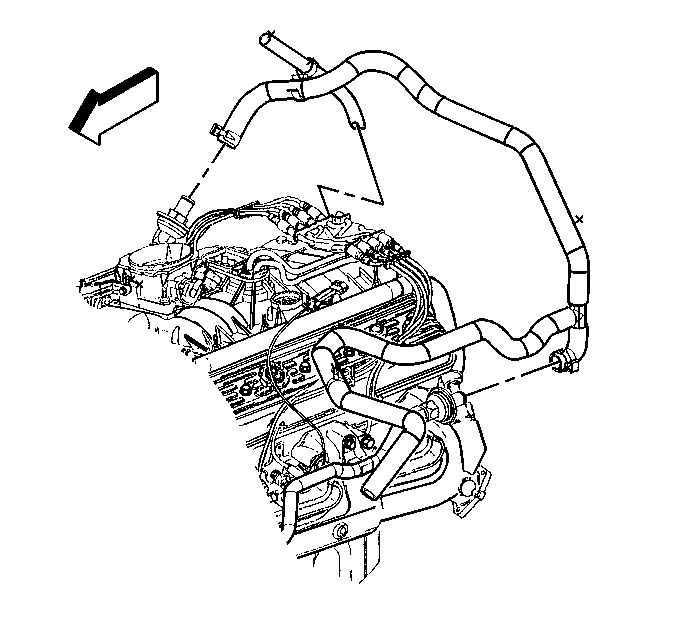
Important: You do not need to discharge the A/C refrigerant.
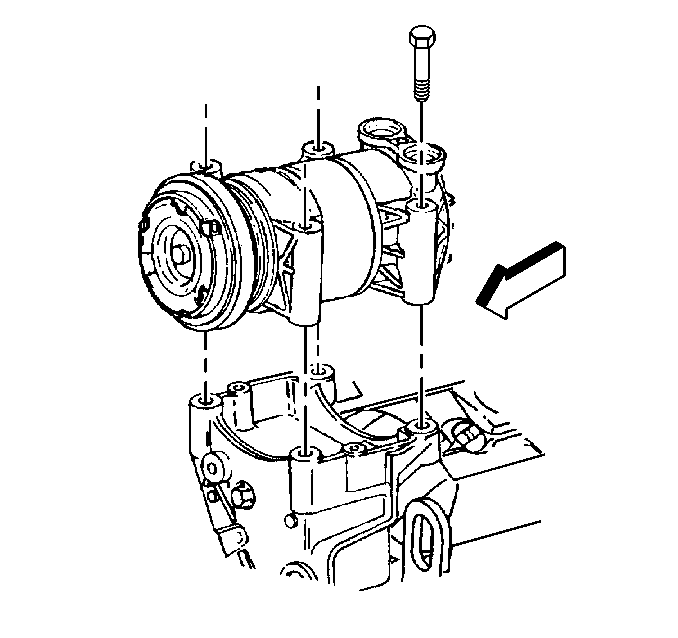
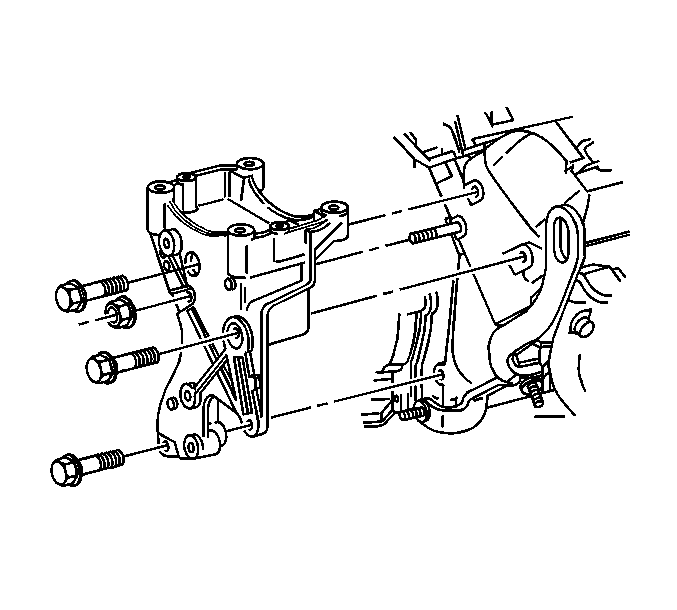
| 15.1. | Remove the nuts holding the power steering pump to the engine. |
| 15.2. | Remove the bolts and the nut that retain the power steering pump to the mounting bracket. |
| 15.3. | Slide the power steering pump mounting bracket forward with the power steering pump still attached. |
| 15.4. | Remove the stud from the cylinder head. |
| 15.5. | Set the power steering pump and the mounting bracket aside. |
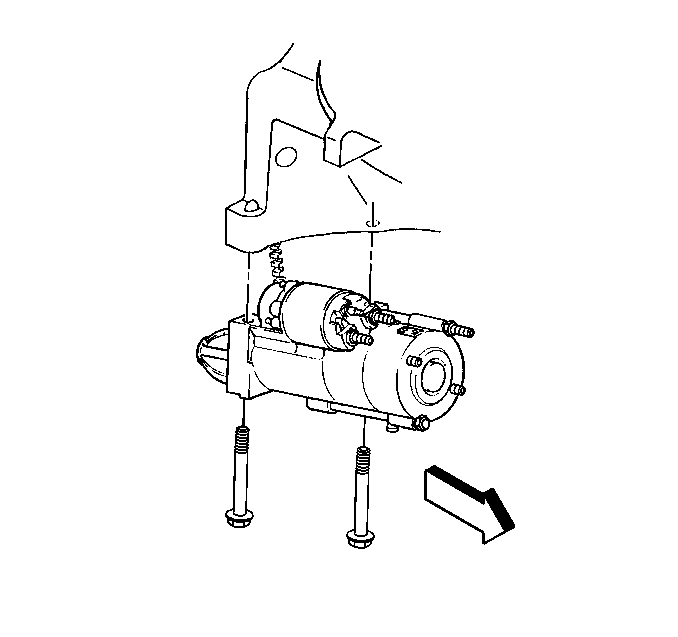
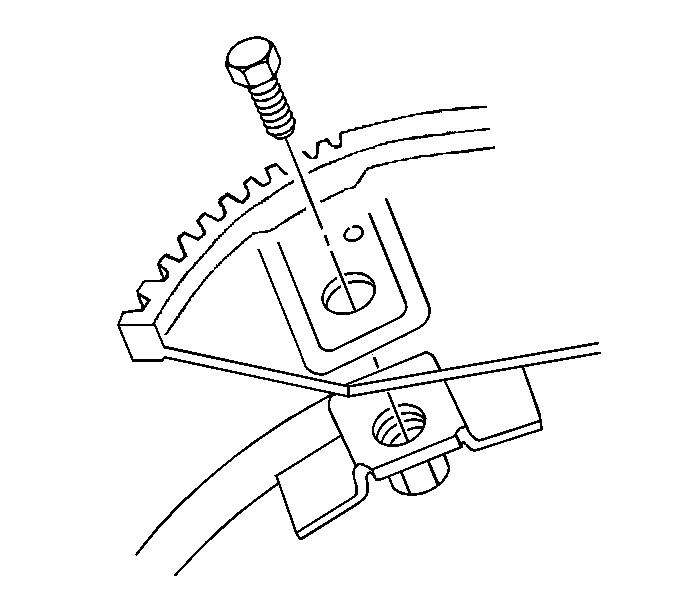
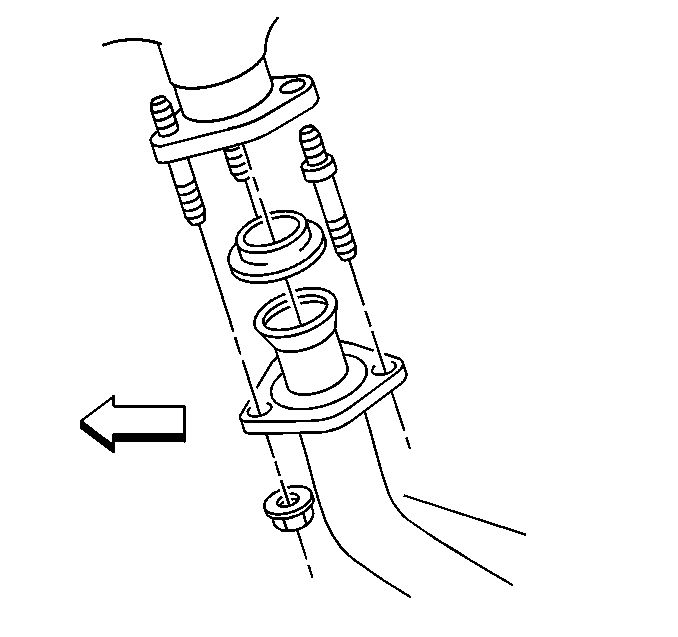
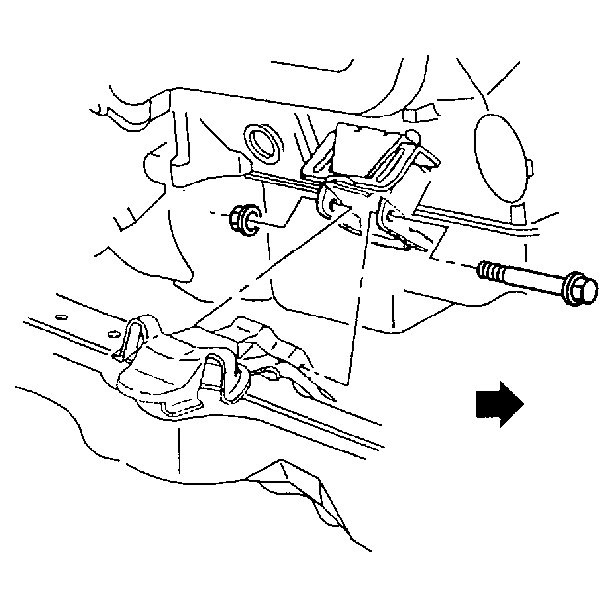
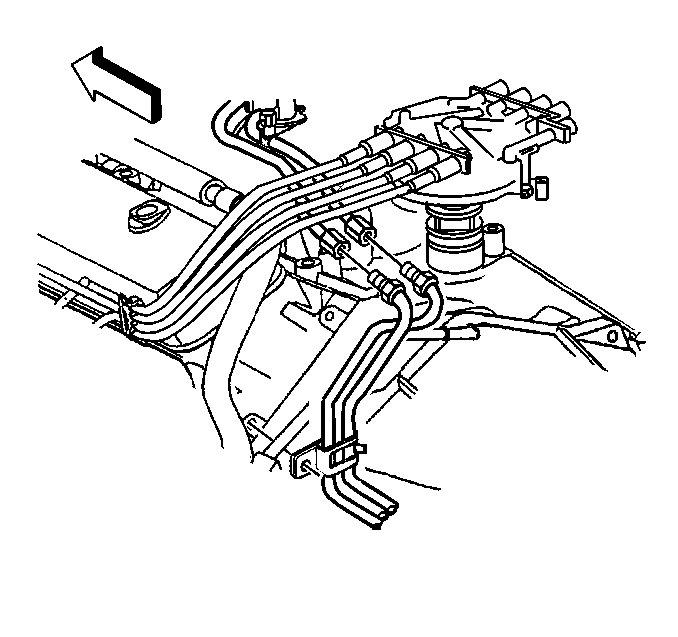
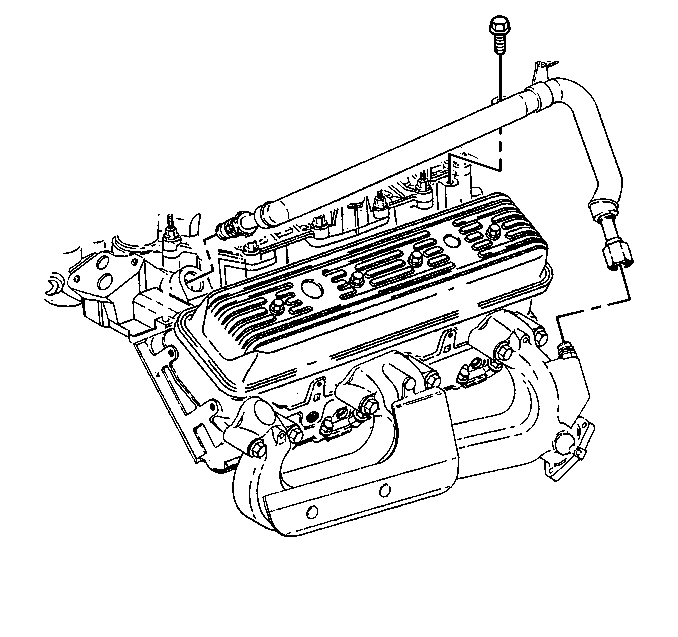
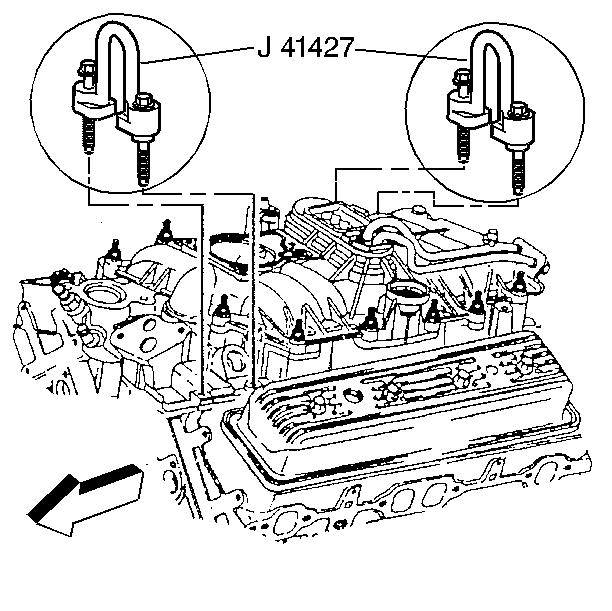
Notice: Use the correct fastener in the correct location. Replacement fasteners must be the correct part number for that application. Fasteners requiring replacement or fasteners requiring the use of thread locking compound or sealant are identified in the service procedure. Do not use paints, lubricants, or corrosion inhibitors on fasteners or fastener joint surfaces unless specified. These coatings affect fastener torque and joint clamping force and may damage the fastener. Use the correct tightening sequence and specifications when installing fasteners in order to avoid damage to parts and systems.
| 31.1. | Remove the right rear lower bolts from the intake manifold . |
| 31.2. | Install the J 41427 marked RIGHT REAR. |
| 31.3. | Install the retaining bolts. |
Tighten
Tighten the bolts to 15 N·m (11 lb ft).
| 31.4. | Remove the left front lower bolts from the intake manifold . |
| 31.5. | Install the J 41427 marked LEFT FRONT with the arrow pointing to the front of the engine. |
| 31.6. | Install the retaining bolts. |
Tighten
Tighten the bolts to 15 N·m (11 lb ft).
Installation Procedure
Notice: If the engine is damaged internally and a new engine assembly is installed in the vehicle, ensure that all foreign material is flushed out of the cooling system. You must also flush out the oil cooler system. Failure to rid the oil cooler system of debris can result in engine damage.
Tools Required
J 41427 Engine Lift
Brackets
- Install the engine to the vehicle.
- Install 2 top transmission to engine bolts, including the brackets and clips.
- Remove the J 41427 and the lifting device.
- Apply thread lock GM P/N 12345382 or equivalent to the threads of the lower intake manifolds bolts.
- Reinstall the intake manifold bolts.
- Tighten the bolts on the first pass to 3 N·m (27 lb in).
- Tighten the bolts on the second pass to 12 N·m (106 lb in).
- Tighten the bolts on the final pass to 15 N·m (11 lb ft).
- Install the EGR valve inlet pipe.
- Tighten the EGR valve inlet pipe intake manifold nut to 25 N·m(18 lb ft).
- Tighten the EGR valve inlet pipe exhaust manifold nut to 30 N·m(22 lb ft).
- Tighten the EGR valve inlet pipe clamp bolt to 25 N·m(18 lb ft).
- Connect the fuel pipes. Refer to Fuel Hose/Pipes Replacement - Engine Compartment in Engine Controls.
- Install the distributor cap.
- Connect the engine harness.
- Raise the vehicle.
- Install the remaining 7 transmission to engine bolts.
- Install both engine mount through-bolts, if equipped. Refer to Engine Mount Replacement .
- Install the oil cooler pipes, if equipped.
- Remove the transmission support strap.
- Install the exhaust pipe to the exhaust manifolds. Refer to Exhaust Pipe Replacement in Engine Exhaust.
- Install the transmission cooler pipe bracket to the right side of the oil pan, if equipped.
- Install 3 bolts that retain the torque converter to the flywheel, if equipped.
- Install the starter opening cover.
- Install the starter motor. Refer to Starter Motor Replacement in Engine Electrical.
- Lower the vehicle.
- Connect the positive battery cable at the generator.
- Connect the engine harness to the top of the engine.
- Install the power steering pump mounting bracket using the following procedure:
- Install the air conditioning (A/C) compressor, if equipped. Refer to Air Conditioning Compressor Replacement in HVAC.
- Install the power steering pump pulley. Refer to Power Steering Pump Replacement in Steering.
- Install the engine cooling fan. Refer to Fan Replacement in Engine Cooling.
- Install the crossover pipe to the AIR check valve, if equipped.
- Install the drive belt. Refer to Drive Belt Replacement .
- Install the new accelerator control cable and connect the cruise control cable, if equipped. Refer to Accelerator Controls Cable Replacement in Engine Controls.
- Install the air cleaner outlet duct. Refer to Air Cleaner Outlet Duct Replacement in Engine Controls.
- Install the upper radiator shroud. Refer to Fan Shroud Replacement in Engine Cooling.
- The radiator inlet and outlet hoses. Refer to Radiator Hose Replacement in Engine Cooling.
- Connect both heater hoses.
- Fill the cooling system. Refer to Cooling System Draining and Filling Engine Cooling.
- Connect the battery negative cable.
- Before starting a new engine, or one that has been repaired, refer to Engine Set-Up and Testing in Engine Mechanical.

Notice: Use the correct fastener in the correct location. Replacement fasteners must be the correct part number for that application. Fasteners requiring replacement or fasteners requiring the use of thread locking compound or sealant are identified in the service procedure. Do not use paints, lubricants, or corrosion inhibitors on fasteners or fastener joint surfaces unless specified. These coatings affect fastener torque and joint clamping force and may damage the fastener. Use the correct tightening sequence and specifications when installing fasteners in order to avoid damage to parts and systems.
Tighten

Tighten

Tighten
Tighten the bolts to 100 N·m (74 lb ft).


Tighten
Tighten the bolts to 75 N·m (55 lb ft).

Tighten
Tighten the nut to 20 N·m (15 lb in).

| 23.1. | Loosely assemble the mounting bracket over the stud. |
| 23.2. | Install a nut to the stud finger tight. |
| 23.3. | Install the 3 bolts finger tight. |
| 23.4. | Install the 2 nuts to the power steering pump finger tight. |
Tighten
Tighten the nuts and bolts to 41 N·m (30 lb ft).


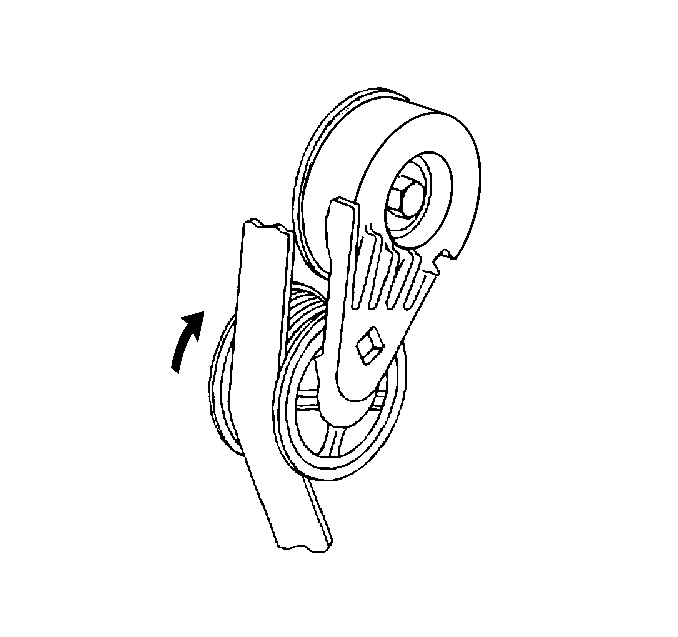
Caution: In order to avoid possible injury or vehicle damage, always replace the accelerator control cable with a NEW cable whenever you remove the engine from the vehicle.
In order to avoid cruise control cable damage, position the cable out of the way while you remove or install the engine. Do not pry or lean against the cruise control cable and do not kink the cable. You must replace a damaged cable.